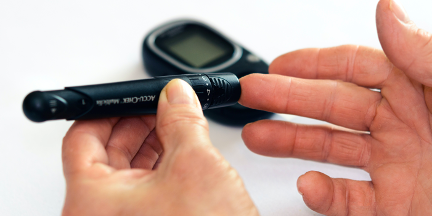Diabetes Melllitus: Foundations and Frameworks


Blood glucose is proof that you can have too much of a good thing. While glucose serves a critical role as fuel for many of our bodily functions, it must remain in a very tightly controlled range. If the level goes too low, you can fall into a coma. If glucose is too high, damage to tissues throughout the body can occur. When blood glucose is consistently too high and the mechanisms that return it to the normal range fail, this is called diabetes mellitus. Nearly 10% of the US population has a form of diabetes, so it is critical that physicians understand the disease and be prepared to care for patients with the diagnosis.
Diabetes mellitus is a condition characterized by a lack of insulin-mediated blood glucose control. Insulin is a hormone released by the pancreatic β cells in the islets of Langerhans, which make up the endocrine portion of the pancreas.
After listening to this AudioBrick, you should be able to:
- Define type 1 and type 2 diabetes mellitus.
- Compare and contrast the pathophysiology of type 1 and type 2 diabetes mellitus.
- Compare and contrast the clinical presentation of type 1 and type 2 diabetes mellitus.
- Compare and contrast diabetic ketoacidosis and hyperglycemic hyperosmolar nonketotic syndrome as complications of diabetes mellitus.
- Describe laboratory tests that help distinguish between type 1 and type 2 diabetes mellitus.
- Compare and contrast management principles for type 1 and type 2 diabetes mellitus.
You can also check out the original brick on Diabetes Mellitus: Foundations and Frameworks from our Endocrine collection, which is available for free.
Learn more about Rx Bricks by signing up for a free USMLE-Rx account: www.usmle-rx.com
You will get 5 days of full access to our Rx360+ program, including nearly 800 Rx Bricks. After the 5-day period, you will still be able to access over 150 free bricks, including the entire collections for General Microbiology and Cellular and Molecular Biology.
***
If you enjoyed this episode, we’d love for you to leave a review on Apple Podcasts. It helps with our visibility, and the more med students (or future med students) listen to the podcast, the more we can provide to the future physicians of the world.
Follow USMLE-Rx at:
Facebook: www.facebook.com/usmlerx
Blog: www.firstaidteam.com
Twitter: https://twitter.com/firstaidteam
Instagram: https://www.instagram.com/firstaidteam/
YouTube: www.youtube.com/USMLERX
Learn how you can access over 150 of our bricks for FREE: https://usmlerx.wpengine.com/free-bricks/
